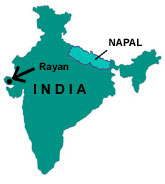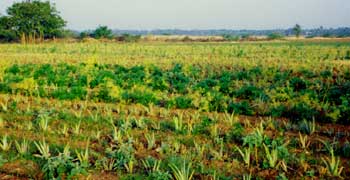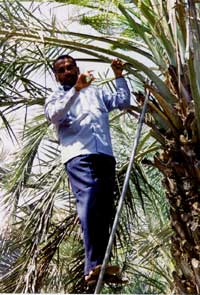|

|
Farm
at a Glance:
NuTech Farm
Location:
The Kutch district on India's western coast. NuTech
farm is located in the Rayan village 9km from
the seacoast town of Mandvi.
Farm Type:
Organic
Size: 42 acres
What is grown: Aloe
vera, dates, amla, melons, millet, castor beans,
mungbean, pigeon pea, vegetables and select medicinal
plants.
|
|

The NuTech bodyguards:
Shah intermingles various crops, such as the castor beans
shown here, to keep disease and pests away from his aloe plants.
 |
"“I’m not the boss here... maybe the
conductor,” says Vijay Shah. “The different players all
contribute in their own peculiar way, from friendly bacteria
and mycorrhizae to termites, earthworms, bats, frogs,
lizards, birds, cattle, dogs and so on." |
 |
|
Delightfully sweet dates
Vijay Shah thanks his father, who died 5 years
ago, for developing dates into a family specialty.
Able to do little else in his old age and ailing
health, his father traveled to the best date farms
in their district of southwestern India. He sampled
date varieties to bring home the best ones in
large quantity. Shah's mother and wife cut up
the dates, planted the seeds, and then distributed
the sweet parts of the fruits to the whole village.
Through rigorous selection, NuTech Farm now produces
date varieties that are remarkably sweet and delicious.
“These are actually my father's legacy,” says
Shah.
|
|
|
 |

 |
Acres of aloe: Some
of Vijay Shah's 30 acres of aloe vera plants in southwestern
India. |
 |
Posted April 22, 2003: In westernmost India,
bordered by Pakistan and the Arabian Sea, lies the tortoise
shell-shaped desert region of Kutch.
The sun beats down mercilessly on brittle scrub brush, cacti,
and salt flats. Rain comes only two or three times a year.
It crashes down in torrents, carving channels through the
cracked, sun-dried soil, racing to the sea before it has time
to soak in.
Last year the region received rain only once – a 3-inch downpour
after two unusually dry years. Kutch sustained massive destruction
from a 2001 earthquake that scored a 7.9 on the Richter scale.
Despite these harsh conditions, farmers continue squeezing
crops out of the begrudging, sometimes forbidding land. A
growing number have decided to work organically precisely
because of these difficult circumstances.
One of these pioneers is Vijay Shah, 45, a bearded, man with
a quick smile. He owns the 42-acre “NuTech Farm,” specializing
in fresh dates and aloe vera. Though he used modern fertilizers
and pesticides for years, there is a commemorative piece of
paper taped to his desk with the penciled note, “1 July 1996:
stopped using chemicals completely.”
In the violent desert climate, Vijay Shah has created an
oasis of peace -- for himself, his extended family, and his
land.
Many influences, from Gandhi to
grandma's blessings
 |
 |
| Hot dates
: Shah uses boiling water in lieu of chemicals
to keep harmful insect populations from ruining
his fruit trees. |
|
Shah’s transition to organic farming was gradual and with many
influences. He compares his situation to the story of a fool
who found himself in a well rescuing a child who had earlier
fallen in. When they both were safely out, the fool was met
with congratulations for his bravery, but responded in irritation
and confusion. “First tell me who pushed me in.”
“I’m still trying to figure out who pushed me in,” Shah says
with a laugh. “Was it my readings of Schumacher's 'Small is
Beautiful,' or Alwyn Toffler's 'Third Wave,' or Gandhi's 'Rural
Independences,' or my Grandma's blessings?”
After spending five years of his childhood with his grandmother
in the small village of Rayan, in southwestern Kutch, Shah
spent most of his early years in Bombay (now Mumbai). He graduated
from college with a degree in printing technology in 1977
and soon after started a printing business with his brother.
Within a few years he began to feel restless. “I could see
that I wasn’t a good businessman,” Shah admitted. “Deep in
my heart I had the inkling that I must work with the soil,
with Mother Nature.”
Looking for a more peaceful existence for him and his father
-- who had recently suffered a heart attack – he and his wife
moved to 4 acres of ancestral land in Rayan village in 1986.
They lived with his father and mother, and began growing crops
of sweet corn, melons, pomegranates, figs and dates.
Vijay Shah started farming with chemical fertilizers and
pesticides. Production was exceptional. “In those days of
fertile soil and available water we had beautiful dates and
shining red pomegranates. We produced up to six times more
than other farms.”
After seven years of synthetic inputs, however, Shah realized
what other farmers in the region are now beginning to understand
-- that chemical farming in their harsh conditions cannot
last. Because the chemical fertilizers he used provided nutrients
only for the plant, his soil structure was weakened. He saw
he had killed many of the beneficial organisms that make the
soil porous and fertile so it can absorb moisture. The soil
lost its finer particles, becoming dead and hardening when
it rained.
During the dry season, wind blew the cracked, dusty topsoil
off his land. When the torrential rains came, they washed
loose soil into flash-flood rivers.
To make matters worse, Shah’s neighbors began growing cotton.
Their reckless pesticides use drove insect pests to seek refuge
at NuTech Farm. He was at a crossroads. “I had to make a decision
– whether to continue the vicious cycle of using more and
more chemicals, or change my whole way of farming,” he said.
Seeking peace, changing paths
 |
 |
|
Plants of the sea feed under-nourished
soil
The brown black seaweed (saragassam wighti) is
harvested about 1 km off the coast of the Gulf
of Kutch and brought back to the farm for processing.
The harvested crop is dried in the hot Indian
sun then run through a thresher which separates
sand and other unwanted stuff and grinds the seaweed
into coarse powder grade. The powder is then packed
in poly bags (30kg each) and stored. The powder
provides additional nutrients to the dry soil.
It can be used as a soak or as a spray. In a year,
NuTech uses 2 tons of seaweed for 30 acres irrigated
land; an additional 6 tons is sold to other farmers.
|
|
Soon after, Shah entered a Vipassana meditation course that
proved to be a turning point in his life. (Vipassana means “seeing
things as they really are.”) A guru gave him counsel that gave
him new insight: “If you’re really looking for peace, then your
livelihood should be peaceful."
Shah realized that instead of the relaxing existence he had
sought in the country, he was experiencing constant anxiety
about his farming life. He was always trying to kill what
he saw as harmful insects -– especially the pesky, resilient
termites. He worried continually about marketing and his steadily
decreasing production.
“I was very stressed. I had to keep using chemicals but the
response was declining,“ he said. “I was scared and asked
myself, ‘What will happen if I stop?’”
As he continued with meditation, Shah began to decrease the
amount of chemicals he applied. “For three years it was very
tough. I didn’t have any information on what to do in the
transition period,“ he said. “They said to stop using chemicals...
but what are the alternatives? It took me a long time to understand
the phrase, ‘healthy soil for healthy plants’.”
Throughout production declines during this period, Shah gradually
began to figure things out. He built up the soil, eventually
developing a set of eco-friendly inputs. The products he uses
and markets to others to maintain soil and plant health include
the plant-based products neem, karnalia, calotropis, euphorbia
and whole aloe. From the Gulf of Kutch he harvests brown seaweed
and green algae. He uses nutrient-rich cattle urine through
his drip irrigation system.
Shah took other steps to protect his soil and shelter plant
life. He mulched more and began leaving low-lying weeds around
plants as living mulch. He planted more trees to lower soil
temperature so it would be more conducive to micro-organic
activity. He planted mixed varieties of specialty trees, such
as neem, sesbania, drumstick trees (Moringa oleifera) and
five-leaved chaste tree (Vitex Negundo) as wind breaks for
his soil. He abandoned use of poisonous fumigants to kill
pests that attacked trunks of his date trees. Now he pours
boiling water in crevices of trunks in affected trees, killing
only harmful insects.
Shah’s new attitude changed the way he looked at termites.
Once he stopped trying to kill them all, he saw they were
benefiting him by breaking down dead matter and providing
good aeration to tree roots. “They don’t eat anything green,”
he said, admiring their work in the trunk of a date tree.
“Now termites are my best friends.”
Shah’s efforts produced results after several years. Plants
grew stronger and gave more fruit. Improved soil held more
moisture. Shah estimated that during one 3-inch downpour his
smaller tract of land retained twice the water of his neighbor’s
chemically farmed land, judging from the reservoirs that receive
the run-off from the ditch system on each farm.
Booker T. and aloe vera
 |
 |
| Convening with the natives:
Thriving in hot dry climates, the aloe vera plant
has found a natural habitat on Shay's farm. Pictured
here: author Jason Witmer. |
|
Shah gleaned some agricultural wisdom indirectly from African-American
educator Booker T. Washington, an idol of his. Washington tells
the story of a ship that was caught in a hurricane off the coast
of South America. When all the ship’s water was gone the distraught
captain radioed in for help from shore. He received the simple
SOS: “Drop your pail where you are.” At first disbelieving,
the captain eventually discovered that the seawater there was
sweet because it comes from the mighty Amazon River, which pours
freshwater into the sea for miles at its mouth.
The story made Shah think about his own life. “There I was
bringing pomegranate plants from 2,000 kilometers away,” Shah
realized. “I was buying sweet corn and melon seeds from U.S.
and Taiwan – everything from such distances. I wasn’t dropping
my pail where I was.“
The day after reading that story, Shah stopped at the gate
in front of his farm and noticed a small patch of aloe vera
plants, growing happily with no human management. Though he
had little knowledge of the potential market, and still less
about how to process the aloe products, he decided to "drop
his pail there." Shah had heard of its uses in ayurvedic healing
and saw advantages in raising a crop that seemed be able to
take care of itself.
He found little information existed for on-farm processing
of the long succulent aloe vera leaves. He and his wife began
experimenting in their kitchen to learn how to extract the
valued gel.
As he expanded production he experienced new challenges.
To counter plant-rot in low areas after the monsoon, Shah
turned to a bed-and-furrow system that he extended to nearly
his entire farm. He planted medicinal Malabar nut (A. Vasica)
trees as a natural irrigation indicator. These help him restrict
water to the minimum that keeps the gel value highest. He
controlled weeds by letting the cattle graze rotationally.
He controls diseases and pests by intercropping the aloe vera
with plants such as dates, amla (Indian gooseberry), melons,
millet, castor, mungbean, pigeon pea, vegetables and selected
medicinal plants.
After four years of trial and error the couple perfected
a suitable extraction and stabilization process. Shah’s brothers
converted a small building into an aloe vera processing plant.
They began marketing aloe vera to cosmetic companies and continued
to improve the quality of their aloe gel.
Manish, Vijay's younger brother, worked to develop a health
drink from their aloe gel. Manish joined 40 scientists from
26 countries in China to interact on aloe use. He returned
with the confidence to prepare six specialty health beverages
with selected medicinal herbs.
Mahendra, their elder brother, is using his marketing genius
to expand production to the European Union next year. At times,
all 17 members of Vijay’s family work together at times to
keep the aloe activities going.
Shah has expanded to 30 acres of aloe vera. He continues to
fine-tune production skills to maintain production even in
dry years such as 2003, where plant color will be diminished
but production remained constant. The date trees, which usually
decline after a few years under chemical fertilizers, are
producing so well that he has named many of them. “They’re
like family members,“ he said.
Shah is helping to develop an organic certification system
for small farmers of India. Right now Shah can only market
his products to people who know him well. With an organic
certification system both he and smaller farmers with fewer
connections could market to anyone. He is on of 35 Indian
organic farmers who hope to draft guidelines for a certification
system by the end of this month.
Regenerative agriculture has given Shah new hope for his rural
life. He is grateful to still be in business. “Many farmers
are tired,” he said. “They’re feeling like they can’t do this
anymore. They’re thinking about doing something else -– maybe
opening a stand and selling cigarettes or something like that.
But I am still farming.“
Shah appreciates most, however, the contentment that he finds
by co-operating with his environment rather than ceaselessly
fighting it.
“I’m not the boss here... maybe the conductor,” Shah figures.
“The different players all contribute in their own peculiar
way, from friendly bacteria and mycorrhizae to termites, earthworms,
bats, frogs, lizards, birds, cattle, dogs and so on. When
that kind of harmony develops there is a reverence for each
other. Initially, I was always tense, worrying, killing –
but now I have peace." 
Coming next: Meet a doctor with the organic
medicine to keep his farm cool and irrigated even in the Indian
desert. Doctor Haria, an alternative agricultural physician
and Mr. Shah's mentor, also has a cure for acne that American
teenagers may not be ready for…
|





